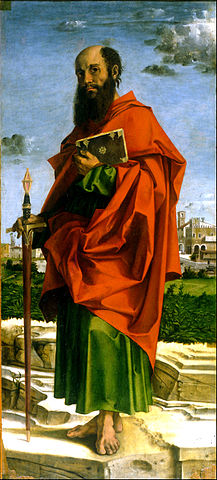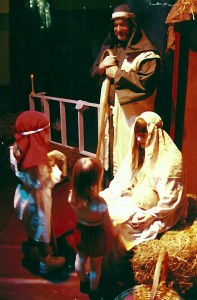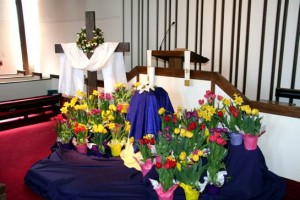Since its beginning, God has called and challenged the Church to create sacred community in the midst of diversity. As Christians, we find the source of our unity in a common commitment to the Person and teaching of Jesus Christ. Yet, as we know from our secular lives, sharing a common friend and some ideas by no means guarantees lack of conflict. We need practical guidance for living in community such as that the Apostle Paul provided to the church in Rome.
 Let love be genuine; hate what is evil, hold fast to what is good; love one another with mutual affection; outdo one another in showing honor. Do not lag in zeal, be ardent in spirit, serve the Lord. Rejoice in hope, be patient in suffering, persevere in prayer. Contribute to the needs of the saints; extend hospitality to strangers. Bless those who persecute you; bless and do not curse them. Rejoice with those who rejoice, weep with those who weep. Live in harmony with one another; do not be haughty, but associate with the lowly; do not claim to be wiser than you are. Do not repay anyone evil for evil, but take thought for what is noble in the sight of all. If it is possible, so far as it depends on you, live peaceably with all. (Romans 12: 9-18)
Let love be genuine; hate what is evil, hold fast to what is good; love one another with mutual affection; outdo one another in showing honor. Do not lag in zeal, be ardent in spirit, serve the Lord. Rejoice in hope, be patient in suffering, persevere in prayer. Contribute to the needs of the saints; extend hospitality to strangers. Bless those who persecute you; bless and do not curse them. Rejoice with those who rejoice, weep with those who weep. Live in harmony with one another; do not be haughty, but associate with the lowly; do not claim to be wiser than you are. Do not repay anyone evil for evil, but take thought for what is noble in the sight of all. If it is possible, so far as it depends on you, live peaceably with all. (Romans 12: 9-18)
In many ways, Paul’s advice is a practical explanation of how to live out Christ’s commandment to “love your neighbor as yourself.” It is a “play book” for creating sacred community on a day to day basis. I commend these words to you for personal study and meditation as we prepare to celebrate the 56th anniversary of this congregation.
Today, more than in the recent past, our society needs the alternative vision of community which the church can provide when it is faithful to Jesus and follows Paul’s concrete advice on how to live out our faith. In many ways, as we left the 20th century behind and moved into the 21st century, our society is becoming more and more like that of Paul’s day. We too live in a pluralistic, increasingly urban, and multi-lingual society. Like Christians of Paul’s day, we live among persons fascinated by materialism and the promise of getting rich quickly.
Our society, like that of ancient Rome, is mesmerized by public spectacle and scandal and divided by competing political and philosophical perspectives. There’s much which might divide us from fellow believers yet Christ calls us to unity. As Christians, we must live in this society, but we need not adopt all its values and behaviors.
We can choose to know Christ and make him known through the example of our life together here at East Hills Moravian Church.
See you in church,
Pastor Derek French
 Take your children on an exciting journey back in time to the streets of biblical Bethlehem on the night that Jesus was born!
Take your children on an exciting journey back in time to the streets of biblical Bethlehem on the night that Jesus was born!
 Following the “Great Recession” of 2008-2009 many gained new appreciation for the role continuing education plays in making oneself employable. In today’s marketplace, no one can afford to be a “one trick pony.” The value of on the job training and continuing education has long been acknowledged. What’s new in this job market is that what once was required to thrive, is now required just to survive.
Following the “Great Recession” of 2008-2009 many gained new appreciation for the role continuing education plays in making oneself employable. In today’s marketplace, no one can afford to be a “one trick pony.” The value of on the job training and continuing education has long been acknowledged. What’s new in this job market is that what once was required to thrive, is now required just to survive. Let love be genuine; hate what is evil, hold fast to what is good; love one another with mutual affection; outdo one another in showing honor. Do not lag in zeal, be ardent in spirit, serve the Lord. Rejoice in hope, be patient in suffering, persevere in prayer. Contribute to the needs of the saints; extend hospitality to strangers. Bless those who persecute you; bless and do not curse them. Rejoice with those who rejoice, weep with those who weep. Live in harmony with one another; do not be haughty, but associate with the lowly; do not claim to be wiser than you are. Do not repay anyone evil for evil, but take thought for what is noble in the sight of all. If it is possible, so far as it depends on you, live peaceably with all. (Romans 12: 9-18)
Let love be genuine; hate what is evil, hold fast to what is good; love one another with mutual affection; outdo one another in showing honor. Do not lag in zeal, be ardent in spirit, serve the Lord. Rejoice in hope, be patient in suffering, persevere in prayer. Contribute to the needs of the saints; extend hospitality to strangers. Bless those who persecute you; bless and do not curse them. Rejoice with those who rejoice, weep with those who weep. Live in harmony with one another; do not be haughty, but associate with the lowly; do not claim to be wiser than you are. Do not repay anyone evil for evil, but take thought for what is noble in the sight of all. If it is possible, so far as it depends on you, live peaceably with all. (Romans 12: 9-18) On
On  There’s an old story about an ingenious monkey trap. Reportedly, the monkey hunters tie a coconut to a tree, drill a hole in the coconut just large enough for a monkey’s hand to reach in, and place a piece of fruit or a nut inside. The monkey comes and is easily able to reach his hand into the hole to grasp the food. Yet when the monkey closes his fist around his prize he can no longer withdraw his hand from the coconut. The delay provided allows a hunter to aim, shoot, and bag a monkey for dinner.
There’s an old story about an ingenious monkey trap. Reportedly, the monkey hunters tie a coconut to a tree, drill a hole in the coconut just large enough for a monkey’s hand to reach in, and place a piece of fruit or a nut inside. The monkey comes and is easily able to reach his hand into the hole to grasp the food. Yet when the monkey closes his fist around his prize he can no longer withdraw his hand from the coconut. The delay provided allows a hunter to aim, shoot, and bag a monkey for dinner.